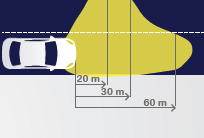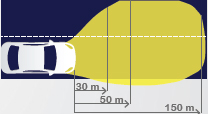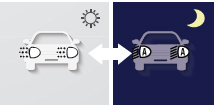Vehicles driven in the dark without lights, or “phantom vehicles,” are a serious safety risk. Some drivers think a lit-up dashboard means their lights are on, which may not be true. It’s also important to use proper lighting in bad weather.
Transport Canada is introducing a new lighting standard to help vehicles and drivers see, and be seen.
New lighting standard
As of September 2021 the Canadian Vehicle Lighting Regulation will require that all new vehicles sold in Canada have one of the following:
- tail lights that come on automatically with daytime running lights
- headlights, tail lights, and side marker lights that turn on automatically in the dark
- a dashboard that stays dark to alert the driver to turn on the lights
This standard will apply to all new vehicles (cars, trucks, SUVs, 3-wheeled vehicles, motorcycles and heavy trucks).
Tips for driving with proper vehicle lights
Don’t put yourself and others at risk. Turn your headlights on when driving in the dark or in bad weather.
You need to know:
- Automatic headlights only work if you set them on automatic
- A bright dashboard doesn’t always mean that your headlights and tail lights are on
- Daytime running lights don’t give you enough light to drive safely in the dark or in bad weather
Understanding your vehicle’s light symbols
| Symbol | Function | Illustration | Information |
|---|---|---|---|
|
Master light switch |
Manually selects the different lighting options of your vehicle. | ||
|
Daytime running lights |
Makes vehicle more visible during the day. |
Note: marking lights are off. |
|
|
Headlight lower beam |
(low beam, passing beam, dipped beam) Lights up the road just in front of your vehicle. |
Use:
|
|
|
Headlight upper beam |
(high beam, driving beam, main beam) Lights up a longer distance, allowing you to see far down a dark road. |
Use:
Switch off when:
|
|
|
Automatic upper beam |
Automatically switches off upper beam when there is oncoming traffic or when there is a vehicle ahead. | Ensures that your lights do not cause glare for other drivers. | |
|
Automatic headlights |
Automatically switches lights on or off according to the amount of light outside the vehicle. | Ensures that your lights are on when you need them. | |
|
Front fog lights |
Provides better view of the road in fog, as they have a wide beam pattern to light up the road directly in front of your vehicle. | Use if driving in fog or snow. | |
|
Rear fog lights |
Makes your vehicle more visible to drivers behind you in fog, as they are brighter than tail lights. | Use only if driving in fog, rain or snow as these lights can be confused with stop lights, distracting other drivers. | |
|
Marking lights |
Activates front position lights, rear position lights (tail lights), side marker lights and licence plate lights. | Make your vehicle more visible to others. Note: headlights are off. |
See and be seen: driving with proper vehicle lights
[PDF, 3.7 MB]
















